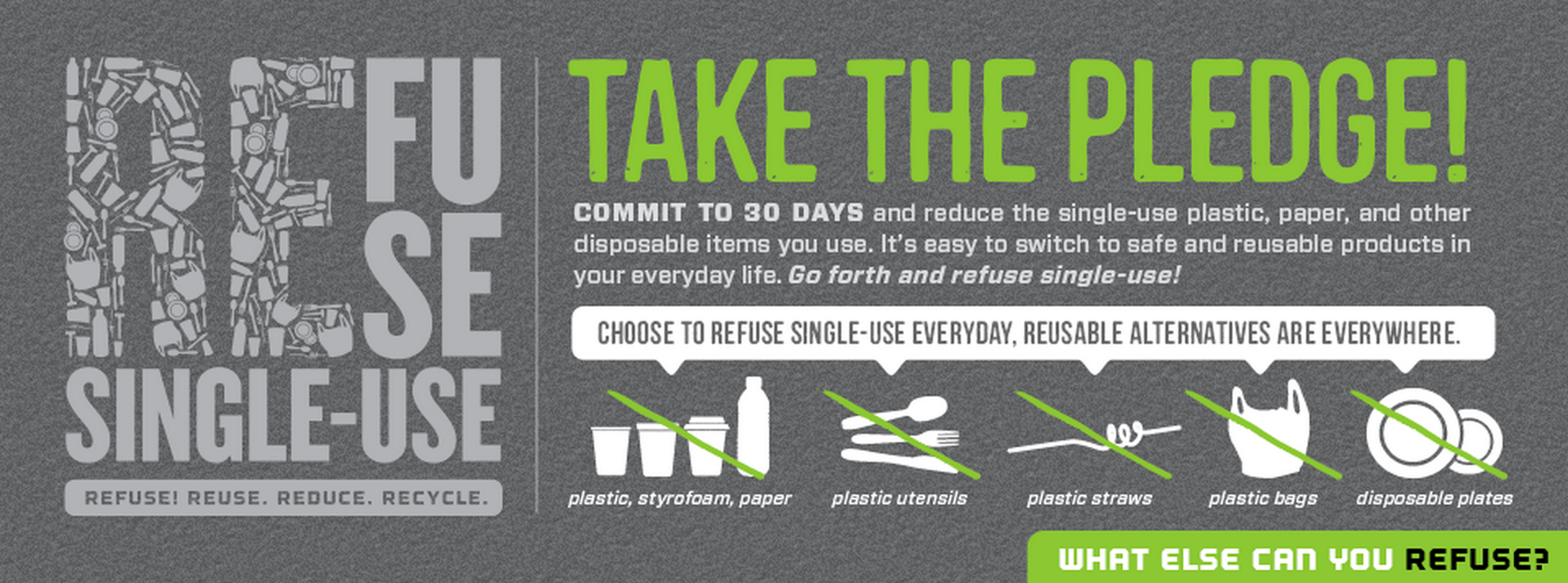We live in a plastic society. Consumption of single use plastics is so ubiquitous that few of us even notice our use of plastic anymore. When you stop to consider how often plastic wrap, plastic utensils, plastic water bottles, plastic straws, plastic bags, or plastic cups cross your path, you may notice a trend. These products are designed to be used only one time which leads Americans to throw out 88 thousand tons of plastic every day. One of the most common and most vilified examples of single use plastic in our culture is bottled water; because it commodities a human right, drinking water, and is costly at every point in its life cycle.


So why is a culture of single use plastic harmful? If we consider the life cycle of plastic we see that the environment, people, and wildlife are harmed by the production and consumption of plastic. For example the manufacture of bottled water requires 17 million barrels of oil every year. Even more fossil fuels are used to ship plastic products around the world to its consumers. People bear the risk of consuming plastic and other endocrine disrupting chemicals when they eat and drink out of plastic vessels. Wildlife and biodiversity is negatively affected when plastic trash ends up in our oceans. All of this risk, just to throw it away.
The root of these ills is not necessarily plastic itself, as it is the culture of throw away and convenience that we live in. Let’s debunk a couple arguments that are complicit in upholding our culture of single use.
What’s wrong with drinking bottled water, or (insert other single use plastic) if I recycle it? Recycling plastic is not a sustainable solution because it never goes away. When plastic is recycled it goes through a transformation that is actually referred to as downcycling, which means it is turned into a lower quality plastic that will then be thrown away. Furthermore some plastic products are not suitable for recycling machinery. For example, although plastic bags are usually marked as recyclable they can get caught in and damage recycling machinery, which then requires manual intervention that places employees at risk.
Reusables are always more sustainable than single use. Turns out that reusable materials such as reuable grocery bags or say, a reusable water bottle, require a greater upfront environmental cost to produce than does lower quality plastic. This means that reusables must be used several, sometimes up to over 100 times, to outperform the cost of single use plastic over its life cycle.
We are in a period of growing pains as this type of life cycle analysis is becoming more and more important in decisions to implement policies such as plastic bag bans. For example, the city of Austin Texas implemented a ban of plastic bags in 2013, only to find that consumers are now throwing away reusable bags at the same rate they were throwing away plastic bags. A much more costly result than the intended expectations.
So what can you do to shift our culture of single use towards thoughtful reuse?

- The Plastic Pollution Coalition suggests adding an additional R, Refuse, to the Reduce, Reuse and Recycle model. Refuse plastic bags at the store. Refuse plastic straws and plastic cups when eating out.
- Switch to reusables. This is less about breaking habits than it is modifying a habit you already have. Keep reusable grocery bags in your car or in obvious places by the door. Bring your own containers to the bulk aisle at the grocery store. Do not throw away resuables. Consider the entire life cycle of a resuable item just as would consider the lifecycle of a plastic item.
- Prevent pollution in the first place by supporting and demanding an investment in clean tap water and public water infrastructure.
For more information, check out
http://www.plasticpollutioncoalition.org/
http://www.stopcorporateabuse.org/campaigns/challenge-corporate-control-water/think-outside-bottle
http://storyofstuff.org/movies/story-of-bottled-water/
http://www.bloombergview.com/articles/2015-08-18/how-a-ban-on-plastic-bags-can-go-wrong